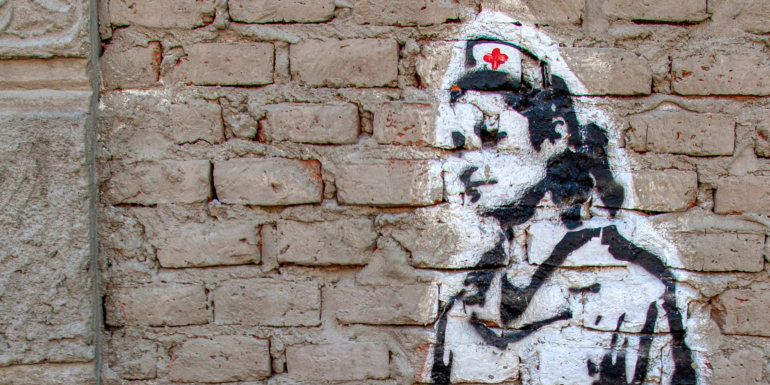
How Faith, Prayer, And Living With Intention Has Carried This Orthodox Jewish Nurse Through Covid
Growing up in a religious home in Far Rockaway, Rachel Travis received “a great education. [Yeshiva] was a great primer for morality, for ethics, for what it means to be a bastion in the universe and always remember my faith.” Travis worked in finance and then ultimately got a degree in Chinese Medicine. “I wanted to pursue something that had a lot more scientific trials and evidence.” Along her path from nursing school to wanting to become a nurse practitioner, Travis ended up working in Oncology. She then shifted to Emergency medicine, a field in which she never imagined working. “But here I am in the middle of a global pandemic, doing what it is that God has asked me to do.”
Despite the disaster preparedness training that was a part of her nursing program, Covid-19 has been unprecedented. While crises have happened to isolated ERs in the past for a limited amount of time, such as during Hurricane Katrina, or Joplin’s Tornado, this pandemic is bringing to task nurses everywhere for unrelenting lengths of time. “[Disaster drills] happen in Israel all the time…but the average nurse is not trained extensively for this.”
Travis treated the first Covid patient on Long Island in the beginning of March where she works at NYU Langone Long Island. “We had been preparing for Corona, as every other institution had. It was the calm before the storm.” The man who came into the ER was treated quickly, but the following day, he needed serious hospitalization. “There’s a difference between somebody who comes in having a little shortness of breath and some tightness in the chest and maybe they just need a few nebulizer treatments, some steroids and they go home, versus somebody who needs hospitalization because they’re having much more challenged breathing and a harder time struggling to keep up with the demand of the body.”
Every time the hospital was near capacity, they found more space or divided half the Emergency department into an ICU. “ER nurses know how to take care of [ventilated] patients. It’s a very specific skill set.” Managing all the different medications and monitoring involved is very taxing. Fortunately for Travis, she had faith to get her through the challenge. “I am somebody who tries to live my life full of intention, and live my life both rooted from on high and… rooted in the world where God wants me to be.” She tried to keep connected during these difficult times. “I always prayed in the morning, I would say the morning blessings in the parking lot at work…but I struggled in ways that I couldn’t have anticipated.” Travis supplemented her prayer with running, writing and meditation in order to not bring the stress home to her family. “I found myself [meditating] more frequently before work and after work.” She listens to lectures and music when she runs. “It helped me feel as though…God put me where He wanted me today. Even though I may doubt myself, I know that He didn’t doubt me. If He was going to put me there, I know that I have something to offer humanity, my patients, my colleagues.”
Because of Travis’ knowledge of Oncology, she would bring her expertise to patients who had cancer and Covid. Even in holding the hands of her patients as they die, Travis tried to bring some deeper understanding. “You have no control over trying to save them, but…we know from hospice and palliative care nursing that when people are dying, the last of their five senses to go is their hearing. So they can hear you, and sometimes just to affirm to people that they are not alone and that they are loved.”
One such memorable interaction occurred on Easter, “and I’m a nice Orthodox Jewish girl. This woman came into the Emergency department, and she was Catholic and it’s their holiday.” The woman, who was already dying, told Travis that her favorite band was The Eagles. “Whatever we were going to do to save her was going to take a lot of discomfort on her part.” In consultation with doctors, Travis knew that this was it for her. Travis played The Eagles on her own phone and tried to show the woman despite her own mask that she was enjoying the music too. “She took her last breath, but she listened to the music that she loved. We put lots of warm blankets and nice lotion on her feet. Those are the ways that we restore people’s humanity and dignity, even as they leave this world.”
At the beginning of the pandemic, Travis asked her Rav “What can I offer the community? He said, certainly don’t work on Shabbat, but offer yourself extra on other days so that your team views you as a colleague. I always have.” Travis expounds. “We talk about that we have this beautiful faith when the sun is shining, where we feel glad and full of life… but when it becomes nighttime, we have a deeper faith inside of us.” She refers to the words of Tov l’Hodos from Tehillim. She has used this to remind her colleagues that “We’re responsible for the effort but the outcome is not ours.” Travis’ colleagues, of every race and religion, see this Torah wisdom as a kiddush Hashem. “We have young people that come in, and they die, we just couldn’t save them…it’s a hard situation for various reasons. You have no idea why a situation occurs.” The stories of Eliyahu Hanavi inspire Travis, who sometimes knows no reason as to why a patient dies. “When we say that we are here because God gave us a mission, he gets to decide what happens, but he acts through us. I’m an agent because he put me here. That is a way that I convey over my faith to my colleagues. We give a lot to each other.”
As a healthcare worker and a person of faith, Travis has now been one of the first to receive the vaccine. “It really is a huge effort.” From the Pharmacist administering the shot, to the UPS man who delivered it, to the scientists who have worked tirelessly for months. “I have a tremendous amount of gratitude to my hospital that they view me as valuable and important, and in doing so, advocating that the Emergency department nurses and the ICU nurses [who] are dealing with Coronavirus patients the most receive it with priority.”
Travis’ obligation to take it goes much further. “If I am supposed to be an ambassador of knowledge and science and information and a woman of deep faith, then this is what the science has produced. There is a lot of misinformation out there and it’s everybody’s due diligence to go ahead and investigate for themselves, not the opinions, but what the science says about it.” For her, it’s simple. “If you trust that oxygen works when someone can’t breathe, or you trust that medications help improve or reduce something, then we also have to trust this.”
Whether or not someone chooses to go into nursing, there are ways to show people care in their moments of pain. “Nobody will ever remember me because I…advanced their care. They will remember me because of how I did something. You can hand someone a blanket or you can wrap them in a blanket,” Travis says. “None of it has to be grand. The grand gestures are easy to impress people with but it’s the smaller ones when your resources are limited. Those are the ones that last a lifetime.”
Travis is hopeful about where the pandemic is heading, even though the end isn’t yet in sight. “We want to hang onto hope that all of the best parts of life, which are seeing people smiles, and holding hands, and hugging, and spending time drinking tea in the presence of people who we love or people who we enjoy will come back. All of us just have to be patient.”
If you found this content meaningful and want to help further our mission through our Keter, Makom, and Tikun branches, please consider becoming a Change Maker today.







